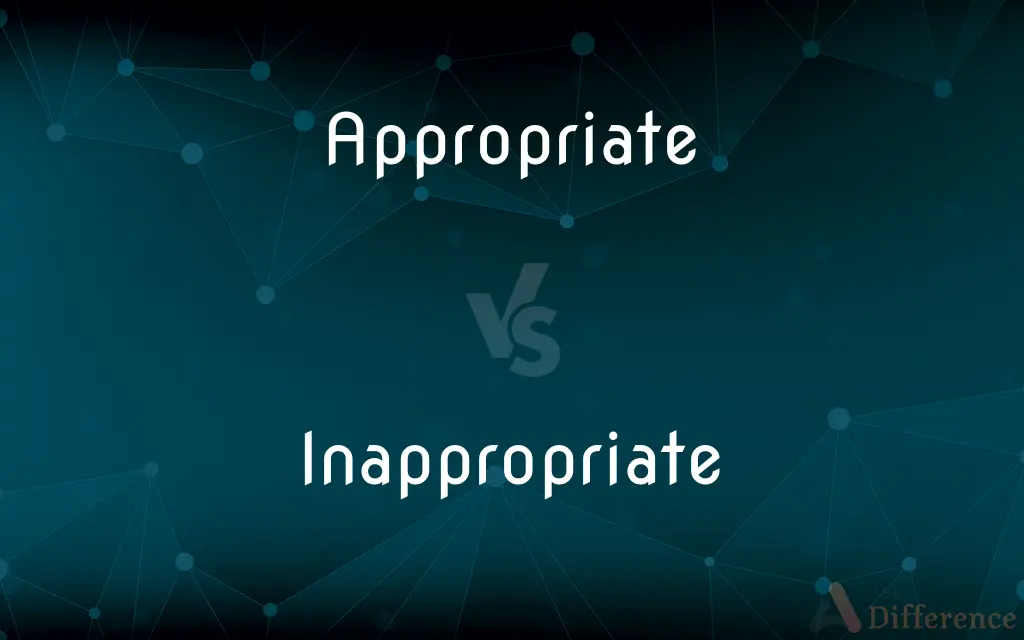Appropriate vs. Inappropriate — What's the Difference?
Edited by Tayyaba Rehman — By Fiza Rafique — Updated on March 13, 2024
Appropriate actions or behaviors are suitable and fitting for the context or situation, while inappropriate ones are not suitable and often considered offensive or improper.

Difference Between Appropriate and Inappropriate
Table of Contents
ADVERTISEMENT
Key Differences
Appropriate refers to behavior, language, or actions that are considered suitable, acceptable, and respectful within a given context, such as following social norms or professional guidelines. In contrast, inappropriate encompasses behaviors, language, or actions deemed unsuitable for a situation, often resulting in discomfort, offense, or a breach of etiquette or professional standards.
When determining what is appropriate, cultural, social, and situational contexts play a crucial role. These factors define the boundaries of acceptable behavior, which can vary widely across different societies and settings. On the other hand, what is considered inappropriate often violates these understood boundaries, disregarding the social or cultural norms of a particular group or setting.
In the workplace, appropriate behavior might include professionalism, respectful communication, and adherence to company policies. Conversely, inappropriate behavior in this context could involve harassment, offensive language, or any actions that violate workplace norms or laws, potentially leading to disciplinary actions.
In communication, appropriate language is tailored to the audience, respectful, and considerate of the listeners' perspectives and sensitivities. Inappropriate language, however, includes slurs, offensive jokes, or any communication that could alienate or harm individuals, reflecting poorly on the speaker's understanding of social dynamics.
The perception of what is appropriate versus inappropriate can evolve over time, reflecting changes in societal attitudes and norms. Actions once deemed acceptable may become inappropriate as communities grow more aware of the implications and impacts of certain behaviors, highlighting the importance of adaptability and empathy in navigating social interactions.
ADVERTISEMENT
Comparison Chart
Definition
Suitable or fitting for the context
Not suitable or fitting; often offensive
Context
Follows social, cultural, situational norms
Violates norms, causes discomfort
Workplace Behavior
Professionalism, respect, policy adherence
Harassment, offensive language, policy violation
Communication
Respectful, considers audience sensitivities
Offensive, disregards listener's perspectives
Evolution
Reflects current societal norms and attitudes
May not adapt to changing social expectations
Compare with Definitions
Appropriate
Suitable or fitting for a specific context or purpose.
Wearing formal attire to a job interview is considered appropriate.
Inappropriate
Not suitable for the given situation, often causing discomfort or offense.
Making jokes at a funeral is highly inappropriate.
Appropriate
Behaviors that align with the cultural norms and expectations of a community.
Observing local customs when traveling is key to cultural appropriateness.
Inappropriate
Actions that are out of place in a social or professional context.
Using a phone during a meeting is considered inappropriate behavior.
Appropriate
Using words that are considerate and respectful to the audience.
Using inclusive language is appropriate in diverse social settings.
Inappropriate
Media or information that is not suitable for certain audiences.
Showing violent scenes in children's programming is inappropriate content.
Appropriate
A reaction that is considered suitable to the circumstances or stimuli.
Offering condolences in times of grief is an appropriate response.
Inappropriate
Wearing attire that does not fit the formality or expectations of an event.
Attending a wedding in casual beachwear is deemed inappropriate dress.
Appropriate
Actions that are deemed suitable within a social or professional setting.
Greeting colleagues politely is seen as appropriate behavior in the workplace.
Inappropriate
Words or phrases that can offend or alienate the audience.
Using slurs or derogatory terms is always inappropriate.
Appropriate
Suitable for a particular person, condition, occasion, or place; fitting.
Inappropriate
Not suitable or proper in the circumstances
It would be inappropriate for me to comment
There are penalties for inappropriate behaviour
Appropriate
To set apart for a specific use
Appropriating funds for education.
Inappropriate
Unsuitable or improper.
Appropriate
To take possession of or make use of exclusively for oneself, often without permission
My coworker appropriated my unread newspaper.
Inappropriate
Not appropriate; not suitable for the situation, time, or place.
It is inappropriate to burp at a formal dinner.
The violent movie is inappropriate for school.
Appropriate
Suitable or fit; proper.
The headmaster wondered what an appropriate measure would be to make the pupil behave better.
Inappropriate
Not instrument (to); not appropriate; unbecoming; unsuitable; not specially fitted; - followed by to or for.
Appropriate
Suitable to the social situation or to social respect or social discreetness; socially correct; socially discreet; well-mannered; proper.
I don't think it was appropriate for the cashier to tell me out loud in front of all those people at the check-out that my hair-piece looked like it was falling out of place.
While it is not considered appropriate for a professor to date his student, there is no such concern once the semester has ended.
Inappropriate
Not suitable for a particular occasion etc;
Noise seems inappropriate at a time of sadness
Inappropriate shoes for a walk on the beach
Put inappropriate pressure on them
Appropriate
(obsolete) Set apart for a particular use or person; reserved.
Inappropriate
Not conforming with accepted standards of propriety or taste; undesirable;
Incorrect behavior
She was seen in all the wrong places
He thought it was wrong for her to go out to work
Appropriate
(transitive) To take to oneself; to claim or use, especially as by an exclusive right.
Let no man appropriate the use of a common benefit.
Inappropriate
Not in keeping with what is correct or proper;
Completely inappropriate behavior
Appropriate
(transitive) To set apart for, or assign to, a particular person or use, especially in exclusion of all others; with to or for.
A spot of ground is appropriated for a garden.
To appropriate money for the increase of the navy
Appropriate
To annex (for example a benefice, to a spiritual corporation, as its property).
Appropriate
To make suitable to; to suit.
Appropriate
Set apart for a particular use or person. Hence: Belonging peculiarly; peculiar; suitable; fit; proper.
In its strict and appropriate meaning.
Appropriate acts of divine worship.
It is not at all times easy to find words appropriate to express our ideas.
Appropriate
To take to one's self in exclusion of others; to claim or use as by an exclusive right; as, let no man appropriate the use of a common benefit.
Appropriate
To set apart for, or assign to, a particular person or use, in exclusion of all others; - with to or for; as, a spot of ground is appropriated for a garden; to appropriate money for the increase of the navy.
Appropriate
To make suitable; to suit.
Appropriate
To annex, as a benefice, to a spiritual corporation, as its property.
Appropriate
A property; attribute.
Appropriate
Give or assign a share of money or time to a particular person or cause;
I will earmark this money for your research
Appropriate
Take possession of by force, as after an invasion;
The invaders seized the land and property of the inhabitants
The army seized the town
The militia captured the castle
Appropriate
Suitable for a particular person or place or condition etc;
A book not appropriate for children
A funeral conducted the appropriate solemnity
It seems that an apology is appropriate
Appropriate
Appropriate for achieving a particular end; implies a lack of concern for fairness
Appropriate
Meant or adapted for an occasion or use;
A tractor suitable (or fit) for heavy duty
Not an appropriate (or fit) time for flippancy
Appropriate
Suitable and fitting;
The tailored clothes were harmonious with her military bearing
Appropriate
Being of striking appropriateness and pertinence;
The successful copywriter is a master of apposite and evocative verbal images
An apt reply
Common Curiosities
Can something be appropriate in one situation and inappropriate in another?
Yes, the appropriateness of actions or language can vary greatly depending on the context, highlighting the importance of adaptability and awareness.
Why is it important to consider appropriateness in communication?
Considering appropriateness in communication ensures respect for diverse perspectives and sensitivities, fostering effective and respectful interactions.
How do societal changes affect perceptions of appropriateness?
Societal changes, such as shifts in attitudes, laws, and cultural norms, can redefine what is considered appropriate or inappropriate, emphasizing the dynamic nature of social behaviors.
How can cultural context influence what is considered appropriate?
Cultural context defines the values, traditions, and social norms of a community, significantly influencing what behaviors and language are deemed appropriate or inappropriate.
What makes an action appropriate or inappropriate?
An action's appropriateness is determined by its suitability and respectfulness within the cultural, social, and situational context, whereas inappropriateness arises from violations of these norms.
How can one navigate differences in what is considered appropriate across cultures?
Navigating cultural differences in appropriateness involves learning about and respecting the customs, traditions, and social norms of other cultures, and being open to adapting behaviors accordingly.
Why might something considered inappropriate become acceptable over time?
Changes in societal attitudes, increased awareness, and evolving cultural norms can lead to a reevaluation of what is considered inappropriate, potentially making it acceptable.
What impact does inappropriate behavior have in social settings?
Inappropriate behavior in social settings can lead to discomfort, offense, and the breakdown of relationships, underscoring the need for sensitivity and respect towards others.
How can one determine if their behavior might be inappropriate in a new cultural setting?
Researching cultural norms, observing the behavior of locals, and seeking guidance from culturally knowledgeable individuals can help determine the appropriateness of behavior in new settings.
What role do professional standards play in defining appropriate behavior?
Professional standards establish the expectations for behavior and communication in the workplace, guiding individuals in maintaining appropriateness in professional settings.
Share Your Discovery

Previous Comparison
Nostril vs. Nare
Next Comparison
Leftover vs. LeftoversAuthor Spotlight
Written by
Fiza RafiqueFiza Rafique is a skilled content writer at AskDifference.com, where she meticulously refines and enhances written pieces. Drawing from her vast editorial expertise, Fiza ensures clarity, accuracy, and precision in every article. Passionate about language, she continually seeks to elevate the quality of content for readers worldwide.
Edited by
Tayyaba RehmanTayyaba Rehman is a distinguished writer, currently serving as a primary contributor to askdifference.com. As a researcher in semantics and etymology, Tayyaba's passion for the complexity of languages and their distinctions has found a perfect home on the platform. Tayyaba delves into the intricacies of language, distinguishing between commonly confused words and phrases, thereby providing clarity for readers worldwide.















































